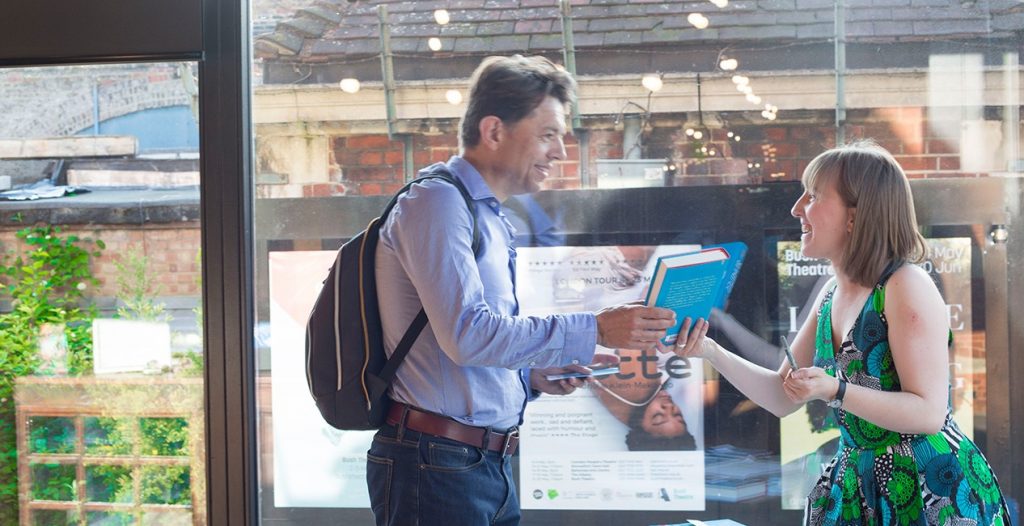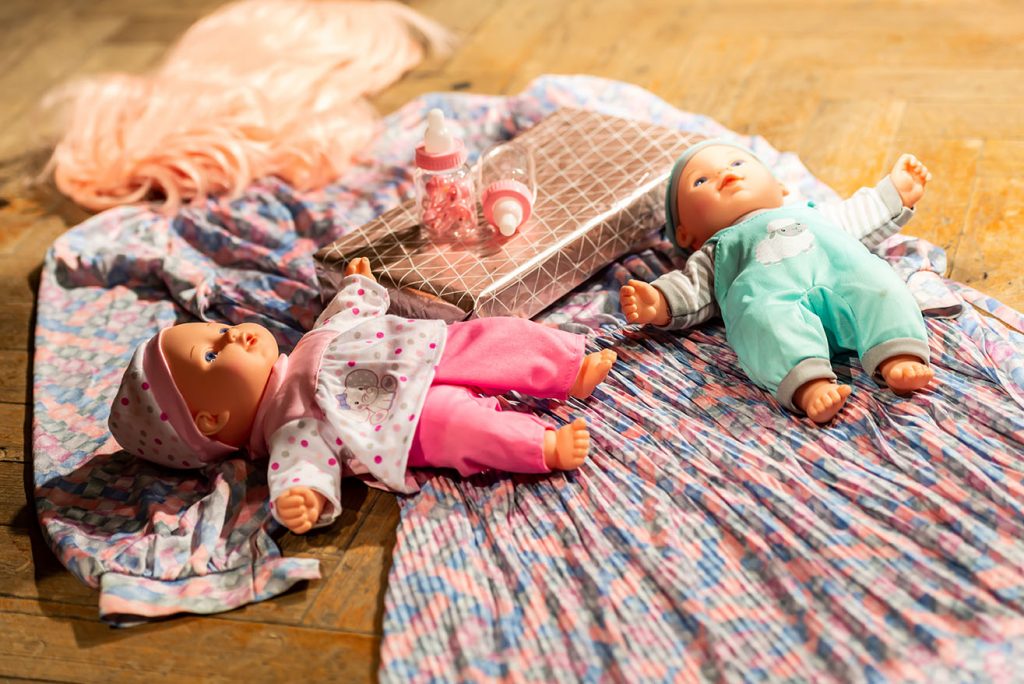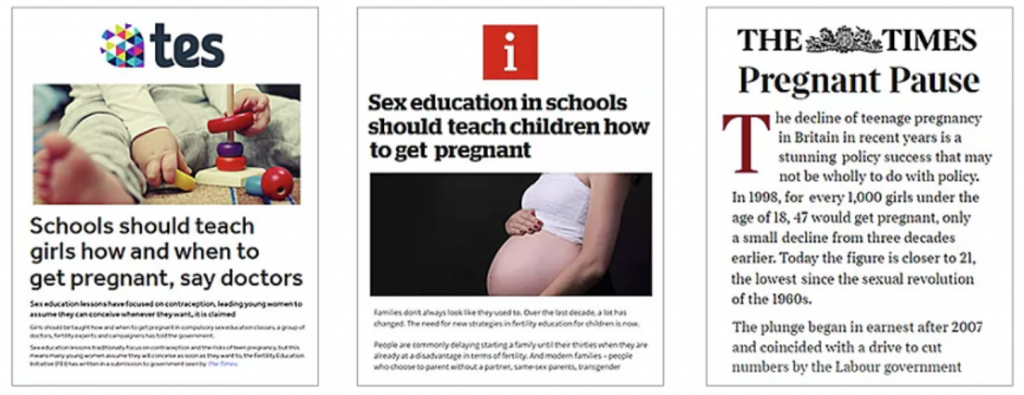Following on from the previous posts exploring the first and second pillars of Fertility Fest’s social mission — improving patient support and public discourse around infertility — in this post we’ll look at the third pillar:
3. To improve fertility education — young people need to learn more than how ‘not to get pregnant’, they deserve a more rounded and robust understanding of human fertility so they have the best chance of creating the families they want in the future — with or without children, with or without reproductive science.

Fertility Education
When you’re told at school in your Sex and Relationship Education lessons that you’ll get up the duff if you so much as come within a 15m radius of a boy, then the following day you see headlines about the latest celebrity to give birth in their 50s — is it really surprising that young people (and quite a lot of older people as well) have such a limited understanding about the factors that could lead to infertility?
The government 10-year teen pregnancy prevention strategy, credited with halving the rate of teenage pregnancies in England, is one of the most successful public health campaigns ever, and is to be used by the WHO as a blueprint in countries that want to emulate its success. (Confession: I spent 2 years working on this initiative, the irony that I turned out to be infertile is not lost on me!)
This is an absolutely fantastic success — but is the information we’re giving young people just one half of the story?
At Fertility Fest we think so. Young people need to know more than how to prevent unplanned pregnancy and STIs, and understanding of fertility needs to go beyond diagrams of human reproduction in biology lessons.
With fertility problems now affecting one in seven heterosexual couples, young people should also be informed about fertility so they stand a better chance of getting pregnant if and when they choose to. And personal, social, health and citizenship education (PSHCE) needs to reflect the modern world in which they’re growing up, covering non-conventional routes to parenthood — as well as people who actively choose not to have children at all.
Then
In 2016, the debate was shaped by the recent success of the teen pregnancy strategy, with a culture that was very resistant to risking these gains by broadening education beyond preventing conception.
An initial pilot scheme in South London to provide 15 year old girls with ‘fertility lessons’ was reported on with scepticism, expressing concerns that warning about declining age-related fertility would add unnecessary pressure to women in their 20s.

Now
Research conducted by the British Fertility Society shows that adolescents know little about fertility but would like to know more — and that this information needs to be engaging and accessible enough that they can bring this knowledge of fertility into their lives.
At Fertility Fest we believe that the arts are a really positive way to do exactly this — not just delivering information in the classroom, but integrating it into the arts to get young people thinking forwards about fertility.
And we’re delighted to be a part of the vanguard making this change happen:
The Fertility Education Initiative
The Fertility Education Initiative is a programme of work dedicated to improving knowledge of fertility and reproductive health in the UK, led by a taskforce of senior professionals from health, education, government and business — including Fertility Fest’s own Jessica Hepburn.
The FEI’s research has demonstrated not only the evidence for the clear need to improve fertility awareness, but also the important role that theatrical and visual arts can play in delivering fertility education to young adults
The FEI recently launched this film, covering some of the key facts young people need to know about why fertility matters:
Modern Families
Modern Families is a collaboration between Fertility Fest, University College London’s Institute for Women’s Health and Cardiff University’s School of Psychology — and a key pillar of the Fertility Education Initiative.
Just as we’re asking you to tell us what you think patient-centred support from clinics should look like, we asked young people to tell us what they wanted fertility education to cover — here’s what we got up to last year when we piloted the project at the National Theatre:
And here’s what some of the participants think about the project:
Next
We think we’ve made a big impact on our first two big aims — but that fertility education is the next frontier, and that we really need to take the debate to the next level.
Which is why we’re absolutely thrilled that the Department for Education (DfE) recently announced that sex education is to receive an overhaul. From 2020 the new curriculum will be both mandatory and LGBT inclusive, and will cover a wide range of new topics: including relationships, the link between physical and mental health, cyber safety, FGM — and reproductive health and fertility. The new guidance includes the need to educate young people about ‘the facts about reproductive health, including fertility and the potential impact of lifestyle on fertility for men and women’.
This new guidance didn’t come out of nowhere: it follows a public consultation last year, that the Fertility Education Initiative contributed to — and we’re really proud of the role that Fertility Fest has played in raising awareness of the need for the curriculum to change. Instead of headlines expressing horror at the prospect of teaching teens about fertility, the press coverage of the FEI campaign reflected a growing call for a more balanced approach to sex education — with our Modern Families workshops even hitting the front page of The Times.

Making it real
It’s fantastic that fertility education now has a place in the curriculum — now we have to define what that actually looks like in practice.
This year we hope to work with a group of young artists to support the campaign for the fertility education that they want, need and deserve and shape what it looks like in schools.What are the issues we think this curriculum should cover? What are some of the questions we should be asking?
Questions like:
- What can you be doing at a younger age to optimise your fertility?
- What age should you start trying to conceive to have the best chance of success in building the family you want?
- How does female infertility decline with age?
- How does male infertility decline with age?
- What about the pros and cons of egg freezing?
- What about freezing embryos with donor sperm?
- When should you be worried if you’re not getting pregnant?
- How common is miscarriage?
- What are the realistic chances of success for IVF at different ages?
- At what point is IVF using your own eggs into diminishing returns and donor eggs are likely to be a worthwhile option to consider?
…and much, much more.
By teaching teenagers about subjects such as how age, obesity and other lifestyle factors can affect fertility, we can arm them with the the right information to understand their own bodies, and to make the best decisions for them and their future.
‘We should focus on preventing infertility, rather than rely on treatment all the time. This is about empowering young people with knowledge”
Professor Geeta Nargund, CREATE Fertility
For many of us, reproductive choice was a myth — we had the choice not to have children, but the choice to have children was taken away from us.
We hope that with the full fertility facts, we can help more people to have this choice — to have the families they want, when they want them.
We’d love to hear your thoughts about fertility education — what do you think young people should know about their fertility? What other issues do you think we should be discussing? Please do email your comments to hello@fertilityfest.com, get in touch on social media, or join us at Fertility Fest to share your thoughts.
This is the third post in a three-part series on Fertility Fest’s social mission
Prev:
Part 1 — Patient Support To improve understanding of the emotional journey of people who struggle or go on a complex journey to conceive
Part 2 — Public Discourse about Infertility & Reproductive Science What it can do, what it cannot do and how it’s affecting the way the human race is being made.